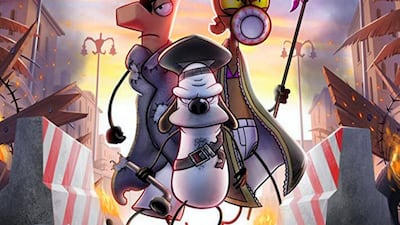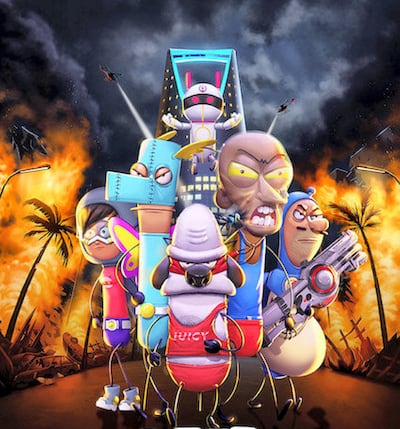When Masameer, the mini-series, first launched online in 2011, there was nothing quite like it. It touched on issues unique to the region in a fresh and hilarious way. But the movie seems like it is still confronting the Saudi society of the early 2010s, neglecting the change that has swept the country over the past two years, which presents a whole new set of material to work with.
Masameer could have provided a great, comical insight to contemporary Saudi society. However, it misses that opportunity.
Even if you haven't seen the the mini-series that the film is based on, the peculiarities of each character are quickly apparent. Ten minutes into the film, which was released on Netflix earlier this week, and you will likely silently swear to follow the characters on whatever journey they're on because the first part of Masameer sets up a promising animation for adults.
But the rest of the film, with its aimless turns and rusty character arcs, will leave you lamenting how much potential was missed.
The animation for grown-ups genre can be an excellent tool for social commentary. Think of the The Simpsons, with its scathing take on American society, South Park with its polemic on pop culture or BoJack Horseman's exploration of mental health and celebrity status.
Whether as a series or film, the genre can take on topical issues, while walking that delicate line between critical thought and being preachy.
Masameer lacks that depth.
The film starts off with a scene that shows shawarmas and falafel sandwiches being prepared for delivery. There’s no shortage of glee at watching the animated shawarma spit being turned and sliced, not to mention the falafel balls being dropped in to the oil of a deep fryer. It all looks as good and appetising as the real thing. After the sandwiches are wrapped and bagged, a delivery man takes them across Riyadh on his motorcycle.
The city, with its tall glass skyscrapers, palm trees and the 99-storey Kingdom Centre, looks spectacular in cartoon.
But even before the film's title hits the screen and the delivery man has reached the address of Masameer's protagonists, we pass by a billboard advertising the Saudi Telecom Company. Product placement in films and series across the world are common, but it later starts to seem as though the logos of STC and Herfy, a fast food chain in Saudi Arabia, get as much screen as any of the main characters.
Masameer: The Movie has a set of quirky and droll characters, many of whom you may recognise from its original mini-series. Three friends – Saad, Saltooh and Kalb – are societal outliers, living in a run-down cafeteria in an affluent Riyadh neighbourhood. There's Dana, an artificial intelligence researcher who has created a robot that takes orders far too literally. Then there's Captain D, the egotistical leader of the Saudi superheroes, and the villainous Bandar, who is set on unleashing a biological weapon on Riyadh.
The movie’s plot begins to take shape when Saad, Saltooh and Kalb are forced out of their cafeteria and home. They are told by a government official that the neighbours have been complaining about the cafeteria’s dilapidated state, which is causing property prices in the area to drop.
However, the trio find hope and purpose again after they stumble upon an invitation to a conference, which gives people the chance to join a renowned Saudi superhero group.
Meanwhile, Dana, whose AI presentation goes horribly wrong after her robot sets her superior’s car on fire, decides on trying out for the group as well.
In the film's first 30 minutes, it hilariously challenges societal issues in a new, unique way. But, what comes after that, for the most part, feels like an ambling and outdated piece of work.
Aside from a few surprising elements, which I won't ruin for you here, I couldn't shake the feeling that Masameer was out of its depth and fared far better as a beloved YouTube show.



